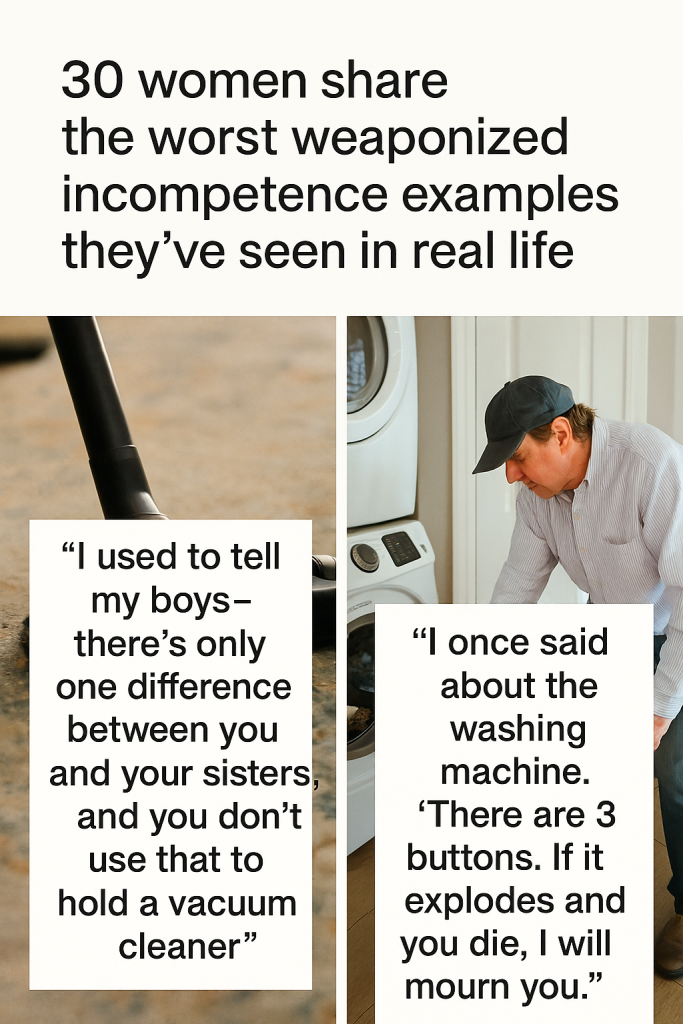In a recent viral social media thread, 30 women have shared their firsthand experiences witnessing weaponized incompetence—a subtle but damaging tactic where individuals deliberately feign ignorance or inability to avoid responsibilities. The candid accounts flooded the internet, raising awareness of this manipulative behavior that often goes unaddressed in everyday life.
Weaponized incompetence is a term that has gained traction in conversations about gender dynamics, workplace relations, and domestic partnerships. It describes a pattern where someone, often a man in domestic or professional settings, purposely underperforms or pretends they cannot complete tasks to shift the burden onto others. This behavior not only breeds resentment but perpetuates unfair power dynamics and inequalities.
One of the women in the thread summarized the issue poignantly: “I used to tell my boys—there’s only one difference between being incompetent and weaponized incompetence. The former is honest, the latter is a choice.” This distinction highlights the intentionality behind the act, which can be difficult to confront given its often subtle presentation.
The examples shared ranged from commonplace household chores to critical professional tasks. Many women revealed how partners or colleagues would refuse to learn how to perform standard duties—like doing laundry, cooking, fixing things, or managing schedules—claiming they “just don’t know how” or “aren’t good at it.” Over time, these excuses forced the women to take on a disproportionate share of work.
One particularly striking account involved a woman who detailed how her partner repeatedly ignored learning how to operate a simple turnstile at a train station. Each time, he acted helpless so she would have to intervene, delaying their commute and reinforcing a dynamic where she always had to pick up the slack. Stories like this resonated widely, illustrating that weaponized incompetence can appear in even the smallest daily interactions.
Beyond personal relationships, some women also pointed out how weaponized incompetence manifests in professional environments. For example, colleagues or supervisors who dodge responsibilities under the guise of “not being good at certain tasks” force others to step in, often leading to burnout and frustration. This tactic can also hinder career growth and workplace equality, especially when predominantly women are expected to absorb these extra duties.
Experts note that weaponized incompetence is an extension of broader societal issues related to gender roles, entitlement, and emotional labor. Understanding and naming this behavior is a crucial step toward addressing it. Psychologists emphasize the importance of setting clear boundaries, communicating expectations firmly, and encouraging accountability to dismantle patterns of manipulative avoidance.
The impact of these viral stories has been profound. They have sparked robust discussions on social media platforms, encouraging others to share their encounters and strategies for dealing with weaponized incompetence. Importantly, the revelations validate the feelings of those who have silently borne the consequences of others’ feigned helplessness, empowering them to seek change.
As conversations continue to grow, the hope is that more people will recognize weaponized incompetence as a form of emotional manipulation rather than innocent clumsiness or genuine inability. Raising awareness helps ensure that responsibilities are acknowledged and fairly distributed—whether at home, in the workplace, or in social settings.
Ultimately, these accounts serve as a reminder that competence is not just about skills but about the willingness to engage and contribute equitably. By calling out weaponized incompetence, women—and all allies—are paving the way for healthier, more balanced relationships and environments.



